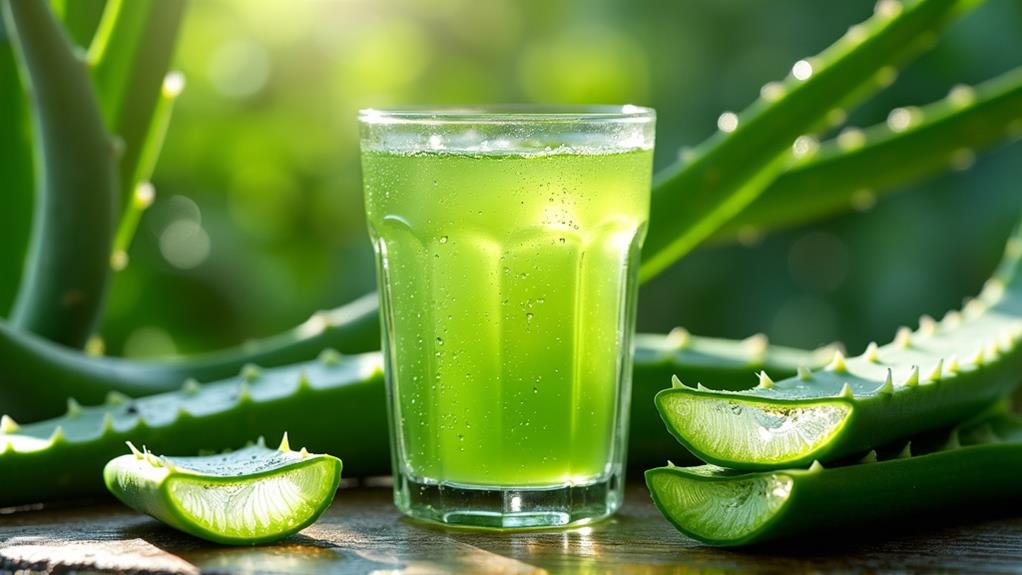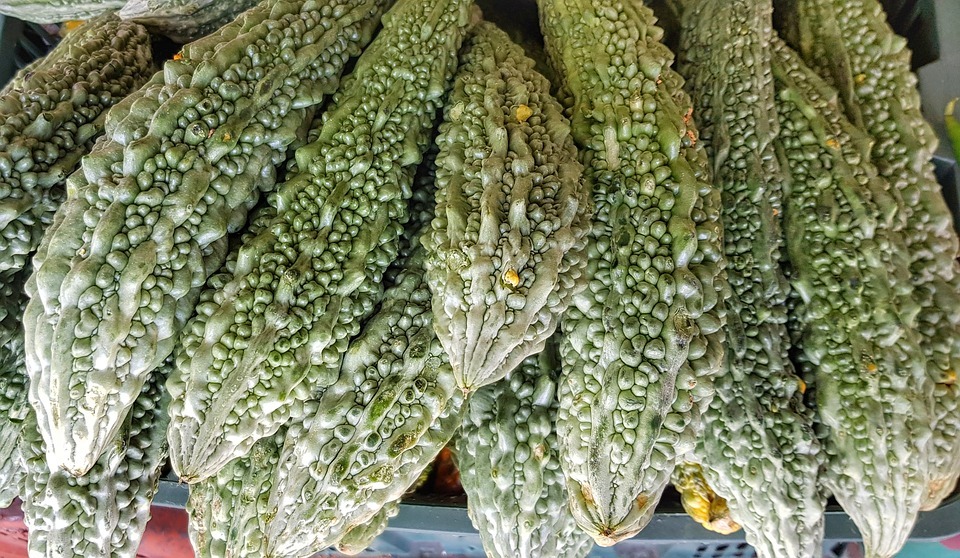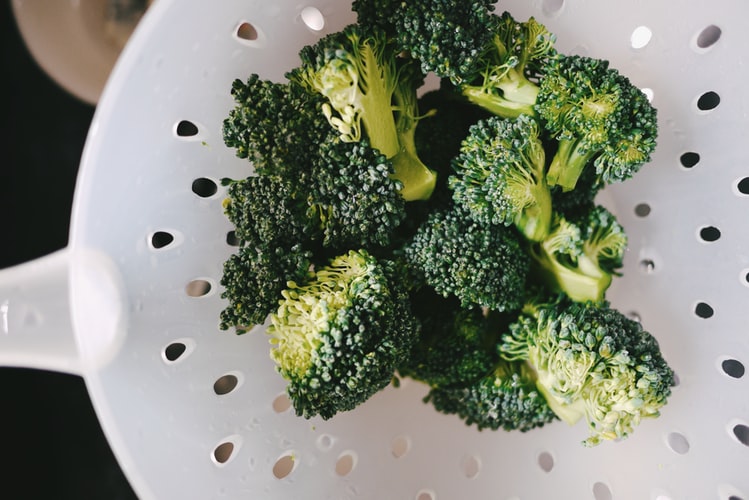Aloe Vera Juice Benefits: Hydration and Healing for Skin and Digestion

Drinking aloe vera juice can improve your hydration and promote healing for skin and digestion. It's rich in vitamins A, C, and E, which enhance skin elasticity and collagen, keeping your skin hydrated and resilient. Aloe's anti-inflammatory properties help reduce irritation and alleviate acne. For digestion, it soothes your digestive tract, aids regularity, and reduces inflammation, benefiting conditions like IBS and GERD. The antioxidants, such as polyphenols, contribute to general digestive health by combating oxidative stress. Incorporating aloe vera juice into your routine truly supports health. Uncover more to see how it fits into your lifestyle.
Nutritional Profile and Antioxidants
Although often overlooked, the nutritional profile of aloe vera juice is impressive and worth noting. Aloe vera juice contains a unique blend of vitamins, minerals, and antioxidants that contribute to your general health. With only 10 calories per 8-ounce serving, it's a low-calorie option packed with fundamental vitamins like A, C, E, and B12. These vitamins not only support immune function but also play significant roles in skin hydration and health.
Aloe vera juice is rich in antioxidants, particularly polyphenols, which help combat oxidative stress. This can potentially reduce the risk of chronic diseases, although research is ongoing to solidify these benefits. The presence of vitamin C in aloe vera juice, providing about 10% of your Daily Value, further supports immune function and collagen production, crucial for maintaining healthy skin.
Moreover, aloe vera juice contains key minerals such as calcium, potassium, and magnesium. These minerals are important for maintaining healthy bodily functions and supporting hydration. By incorporating aloe vera juice into your diet, you're enhancing your body's ability to stay hydrated and nourished while benefiting from its antioxidant properties.
Digestive Health Support
Supporting digestive health is one of the standout benefits of aloe vera juice. If you've struggled with constipation, aloe vera juice might be your ally, thanks to its anthraquinone glycosides, which naturally promote regular bowel movements. This can provide much-needed relief and support your general gastrointestinal health. For those dealing with the discomfort of irritable bowel syndrome (IBS) or gastroesophageal reflux disease (GERD), aloe vera juice has soothing effects on the digestive tract that may help alleviate symptoms.
Daily consumption of aloe vera juice could be particularly beneficial if you're managing conditions like ulcerative colitis. The juice reduces inflammation and promotes healing of the gastrointestinal lining, making it a powerful addition to your digestive health regimen. Rich in antioxidants, aloe vera juice also combats oxidative stress, further enhancing digestion.
But the benefits don't stop at digestion. Aloe vera juice acts as an effective mouthwash, supporting oral health by controlling plaque and reducing gingivitis. This contributes to digestive well-being, as a healthy mouth is the initial step in the digestive process. Incorporate aloe vera juice for a thorough approach to healing and digestive health.
Skin Health Advantages

Aloe vera juice offers impressive benefits for skin health, thanks to its rich content of vitamins A, C, and E. These vitamins are essential for improving skin elasticity and enhancing collagen production, especially if you're over 40. By increasing collagen production, aloe vera juice helps maintain youthful skin. Its antioxidants play a significant role in combating free radicals, reducing oxidative stress, and slowing down aging signs.
If you're dealing with acne or irritated skin, the anti-inflammatory properties of aloe vera juice can be a game-changer. It soothes skin irritation and reduces acne severity, making your skin clearer and calmer. Daily consumption of aloe sterols found in aloe vera juice aids in moisture retention. This guarantees your skin stays hydrated and healthy, preventing dryness and flakiness.
Moreover, aloe vera juice is known for its wound healing abilities. It promotes faster healing and minimizes scar formation, making it effective for treating minor burns and skin injuries. By incorporating aloe vera juice into your routine, you're giving your skin the tools it needs to stay hydrated, youthful, and resilient against environmental stressors. Adopt the natural benefits for ideal skin health.
Immune System Enhancement
When you sip on aloe vera juice, you're not just quenching your thirst; you're giving your immune system a powerful improvement. Aloe vera is packed with polysaccharides that elevate immune function by ramping up the activity of your immune cells. This means your body becomes more adept at fighting off infections and pathogens. The rich vitamins in aloe vera juice, especially A, C, and E, contribute to a balanced immune response, strengthening your overall health and resilience.
Antioxidants in aloe vera, like polyphenols, play an essential role in combating oxidative stress. This is significant because oxidative stress can lead to chronic inflammation, which is often linked to weakened immune responses and various health conditions. By reducing inflammation, aloe vera helps keep your immune system strong and less susceptible to infections.
Moreover, regular consumption of aloe vera juice may modulate your immune system, offering potential benefits against autoimmune disorders. Its anti-inflammatory properties not only reduce chronic inflammation but also help maintain a well-functioning immune system. So, in relation to improving your body's defenses, aloe vera juice is a natural and effective ally.
Considerations for Safe Use

Before you pour yourself a glass of aloe vera juice, it's vital to be aware of some key safety considerations. Oral consumption should be approached with caution due to the potential for gastrointestinal issues like diarrhea and abdominal cramps. These problems arise from aloin, a laxative compound in aloe latex. The FDA has even disapproved over-the-counter sales of aloe vera laxatives because of these safety concerns, making it fundamental to understand the risks involved.
To minimize adverse effects, limit your intake to one cup daily. This allows you to assess your individual tolerance and make any necessary adjustments. It's wise to monitor for side effects, particularly any digestive discomfort, as personal tolerance can vary greatly. If you experience any issues, reconsider your consumption levels.
Before adding aloe vera juice to your routine, consultation with a healthcare provider is strongly recommended, especially if you have underlying health conditions or are on any medications. They can provide guidance tailored to your specific health needs. By taking these precautions, you can enjoy the benefits of aloe vera juice while minimizing potential risks, ensuring a safe and advantageous experience.




